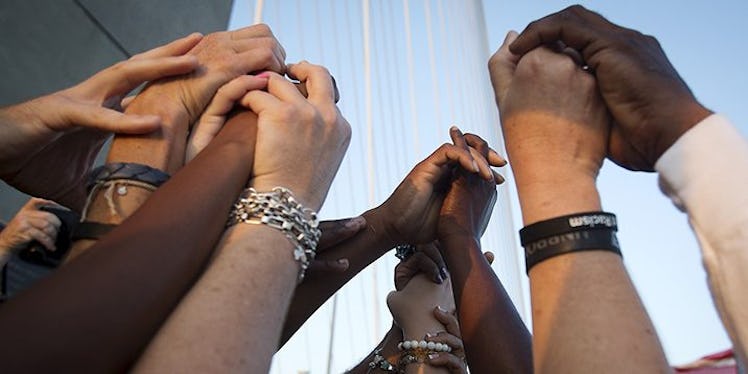Don't get it twisted.
Racism is still alive and well in 2017, and it's not just a matter of people disliking each other, either.
Racism is going strong in destructive ways that impact, among other things, whether or not people can buy a home and whether they can get a job.
The implications of race on the pursuit of happiness is well documented. And in a world where Google exists, anyone willing to set aside their skepticism would easily discover everyday acts, laws and ideologies of racism with the slightest bit of research.
That being said, I avoid labeling people "racist" as much as possible.
Why? Because the word is often taken advantage of, and too often, becomes a huge distraction.
Calling people racist requires exploring the question of whether they're actually, you know, racist. And that tasks prompts us to ask the most ridiculous follow-up questions.
Does he have black friends? Does she give to a black charity? Do they like a black athlete? Didn't they listen to a song by that black artist once? I'm pretty sure he had a black teacher back in the 2nd grade to whom he gave an apple.
And even seemingly smart people allow themselves to get sucked into this ridiculous line of questioning.
Need an example? Let's turn our attention to Fox News' Tucker Carlson, who recently invited to his show a UConn professor who argues President Trump's election was partly fueled by white supremacy.
Carlson, a very intelligent news host, found himself asking a very unintelligent question: "If this nation employs white supremacy then why do we let in non-white immigrants?" As if that fact alone could make a country immune to racism.
Now turn your attention to Paris Dennard, who was on CNN a few months ago defending Trump's chief strategist, Steve Bannon.
Dennard argued against the idea that Bannon is racist by noting Bannon has managed black people.
Regardless of what you think of the two topics Carlson and Dennard were discussing, the arguments they raised were borderline irrelevant. Borderline irrelevant information is often what people get when debating who is and who isn't a racist, though.
I'm happy to go in another direction.
I don't care how much affection an officer has in his heart for an unarmed black kid he shot.
I want to talk about why the department he works for is proven to arrest, ticket, harass, strategically profit off of, lie to and mistreat black people.
I don't care how many black people Steve Bannon hired; I want to know why a man who was happy to embrace the alt-right is directing strategy for the president.
I don't care how many black supporters politicians have; I want to know why those same politicians keep pushing for voting laws that judges deem racist.
I am totally uninterested with racist men. I'm concerned about racist laws.
So, is America "racist," per se? I mean, you can certainly spend time making that case, if you'd like.
But while you're looking for the answer to that question, I'll stick to what I know: Racism remains a destructive force in society.
It is effective in impeding black people's prosperity in housing, education, employment, at the voting both and other areas.
It did not fly and go away after the Civil Rights Era. At best, it only changed in the way it is packaged and employed, which is made most notable by the disturbing levels at which black people have been disproportionately arrested since the '70s.
If I have to drop "racist" from my vocabulary to help keep the focus on actual racism, so be it. And if you want to share in that focus, consider this a friendly suggestion to do the same.
